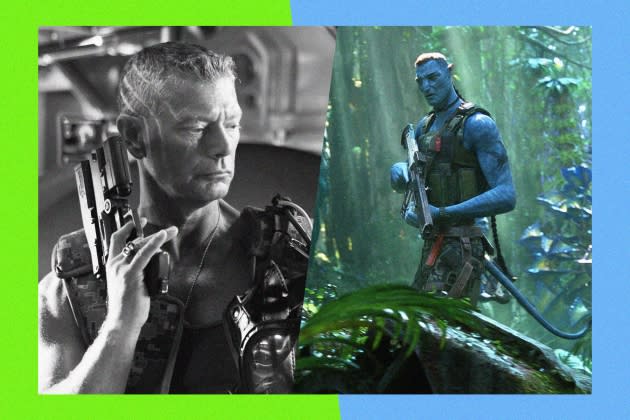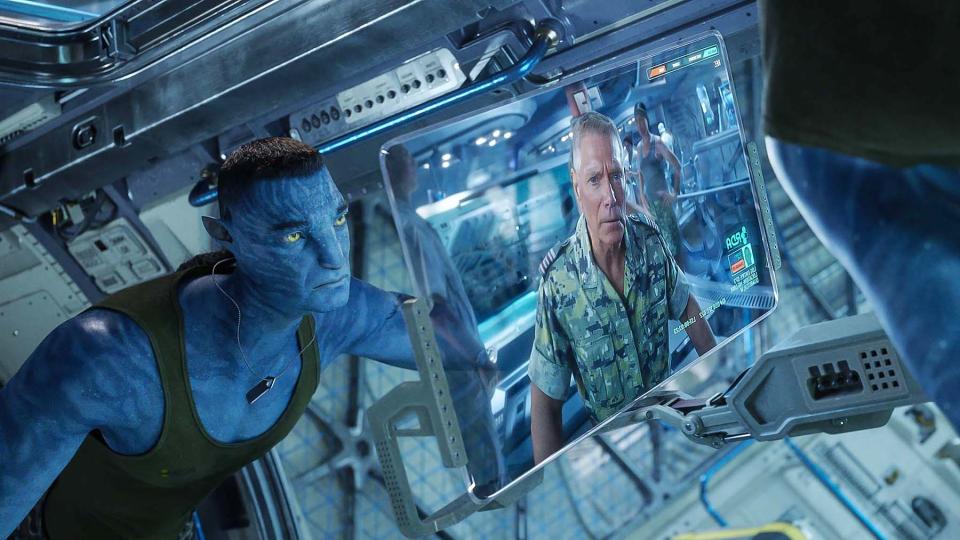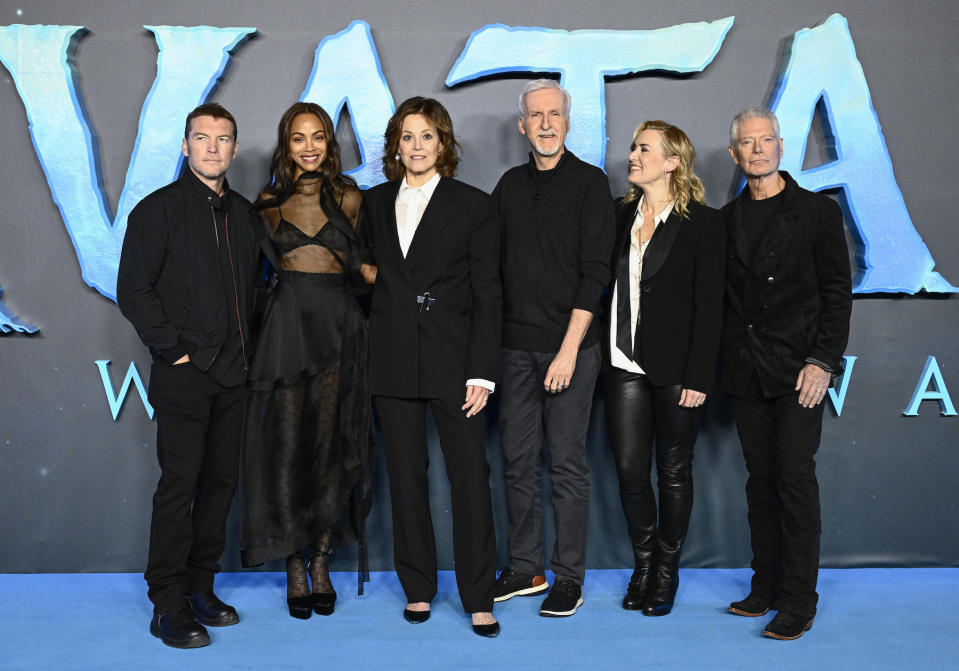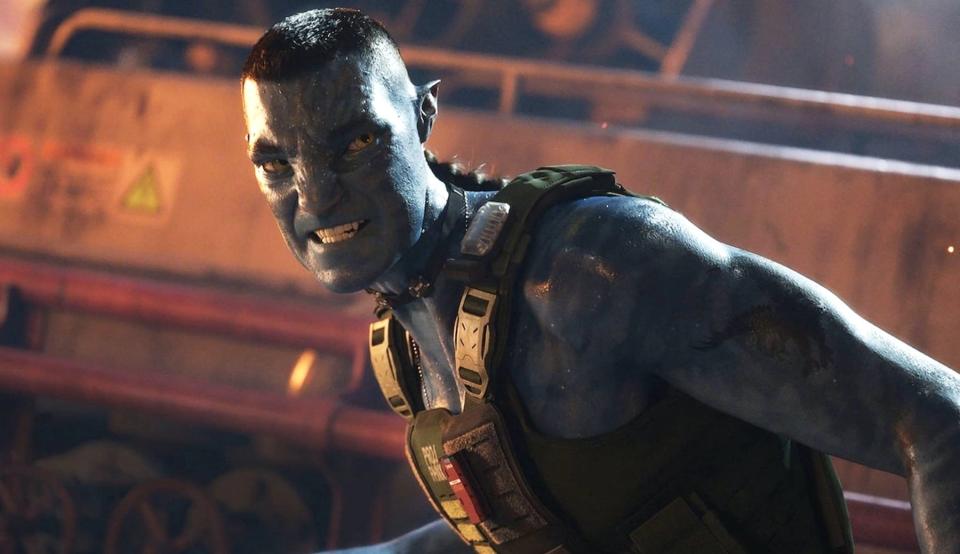‘Avatar: The Way of Water’s’ Murderous Villain Tells All
- Oops!Something went wrong.Please try again later.
- Oops!Something went wrong.Please try again later.
- Oops!Something went wrong.Please try again later.
- Oops!Something went wrong.Please try again later.
- Oops!Something went wrong.Please try again later.

You’d seen that square jaw before, whether as fast-talking tabloid journalist Freddy Lounds in Manhunter, Col. Nathan Jessup of Broadway’s A Few Good Men, cowardly Ike in the Western Tombstone, or one of the FBI agents who gunned down Dillinger in Public Enemies. But it wasn’t until decades into Stephen Lang’s career, in 2009’s Avatar, that the character actor par excellence transformed into an international name.
As Colonel Miles Quaritch, head of the RDA corporation’s murderous security force, Lang—all hulking biceps and snarl—exuded unbridled machismo. He was Arnold Schwarzenegger’s Predator supersoldier gone haywire; a menace to Na’vi society hell-bent on eradicating the blue forest-people. Lang was 57 years old when Avatar debuted in theaters, grossing over $2.7 billion and becoming one of the highest-grossing films ever. He’s 70 now. And James Cameron’s long-awaited sequel, Avatar: The Way of Water, is finally upon us. It will be followed by Avatar 3 in 2024; Avatar 4 in 2026; and Avatar 5 in 2028. The second and third installments were shot simultaneously, while the fourth is currently in production.
More from Rolling Stone
Retiring GOP Senator Knocks Trump's 'Unbelievably Terrible' Campaign Rollout, Says Influence Waning
SNL: Cecily Strong's Kimberly Guilfoyle Hijacks Trump's NFT Grift
In Avatar: The Way of Water, Lang’s Quaritch—who was left for dead in the first outing, thanks to a pair of arrows plunged into his chest by Neytiri (Zoe Saldaña)—has been reanimated as an avatar by RDA, and is out to not only kill Jake Sully (Sam Worthington) and avenge his own death, but turn Pandora to dust. His only semblance of a soul lies in Spider (Jack Champion), a feral child born and raised on Pandora—and his son.
Lang grew up in the concrete jungle—Jamaica Estates, Queens, to be exact, mere blocks from the Trump family. And his father, the entrepreneur and philanthropist Eugene Lang, apparently despised them.
“My father distrusted money,” Lang tells Rolling Stone. “He thought it could turn people into greedy, blithering idiots, and I think Donald Trump is an absolute example of that.”
We talked about everything from his family run-ins with the Trumps to his blood-drawing performance as Quaritch in Avatar: The Way of Water over the course of our chat.
So, how did a New York City theater actor end up being the villain in one of the biggest movie franchises ever?
It’s a New York City theater story! I was preparing to open my solo play, Beyond Glory, at the Roundabout Theatre on Broadway. They were placing ads for the show in The New York Times, and one of the ads was me looking stacked—it’s a military play—and the casting director for Avatar, Margery Simkin, saw the ad and went, “Huh? Hey, Jim, do you know Lang?” and he said, “Oh, he’s a good actor. He auditioned for Aliens, gave a good audition, and almost got the part.” So, they both saw the ad in the Times and went, “Quaritch.” And they sent me the script, and I read it, and it blew my mind. I had a meeting with Jim on the phone, and then on my day off from the theater, on a Sunday after my last matinee of the week, they flew me out to LA, I met with Jim, and by the time I got back to New York on Monday night I had an offer to do it. It was all because of that ad in The New York Times!

Which role did you audition for—and come close to landing—in Aliens?
I can’t remember if it was either Billy [Paxton’s] role or the Michael Biehn role. They’re both great in their respective roles. I would have been good too, but what are you going to do. But Jim Cameron remembered that audition very specifically, and he chapter-and-versed that audition to me later on, so in a way, I view getting Avatar as the longest callback in the history of film. [Laughs]
The Avatar films tackle heady themes—having respect for nature, the environment, Indigenous cultures. What about the films’ message spoke to you?
In terms of The Way of Water, the protection of the family, the nurturing of not only the family you’re born into but the one you inherit, and the fact that these clans see themselves not only as stewards of each other but stewards of the environment—and that they see themselves as one with not only their environment but fellow creatures. These are lessons that we need to learn from if we want to continue to inhabit our own home. One of the great strengths of this film is that Jim can address these themes, but it’s couched in a tremendously entertaining, escapist saga.
Do you think it was your early stage role in A Few Good Men that sent you down this path of playing military and/or authority figures?
[Laughs] I don’t know! It’s possible I missed my calling and should have had a career in the Marines, you know? Certainly, in A Few Good Men, I tapped into something there where I intuitively had a feeling for it—and playing Col. Jessup did have an effect on my career. When it came time to make the film they went to Jack Nicholson for it, and that’s not unusual in our business—and certainly Jack Nicholson is one of the great screen actors of our time, so there’s no shame for it—but I’d had success in that role, so in some sense when Quaritch came along I thought, “This is the military role I’ve been waiting to do.”
Let’s talk about Quaritch in this film. He’s out for revenge, but also you were allowed to show different layers to the character due to his relationship with his feral child, Spider.
We do get to explore some layers of his personality that were not relevant to the first film in any way. I think that it would be pointless to bring the character back if he was just going to repeat his shark-like aggression of the first film. He is aggressive, but it’s worth nothing that Quaritch didn’t ask to be brought back. He’s reconstituted and has had nothing to say about it. For all I know, Quaritch is basking down in the infernal fires with Chesty Puller and Nathan Jessup. He’s hanging around in hell, and then all of a sudden he gets a jolt from the blue because the people who run RDA felt it’s worth the expense to make an avatar of Quaritch. And he’s aware of the irony in being reconstituted as the thing he wants to destroy.
Quaritch is very dead at the end of the first film, so when did James Cameron swoop in and let you know that you’re signed on for four more films?
I knew way back that he had plans to bring back Quaritch, but for all I knew it could have been in a flashback or a prequel. I think it was in 2010 and 2011 that he began to chart out the arc of this character for me, and in 2013 he said that Quaritch would be played out over the course of five films. It’s a great gift, because we can parse it out as it goes. There are so many possibilities to come for him.
How did filming Avatar 2 and Avatar 3 compare to your experience on the first film, since in that one you’re entirely in human form and, at least in The Way of Water, you’re entirely in avatar form—save a short video recording where you address your avatar self.
Doing the live-action work back then was challenging. So much of it had to do with my physical demeanor. The brief I got from Jim was, “I want you as big as you can be and as hard as you can be.” I like that kind of a note, because I know how to deliver on that. It just means you’re going to get up at four in the morning and put in the time. As far as the acting of it, I felt like I understood it and wore it comfortably. Things get more esoteric and mysterious in this one, since Quaritch is on far more nebulous ground. The big difference is that I was delivering the role via performance capture, and for my money, performance capture—for the actor—is the defining process for this particular Avatar world. I learned from watching Zoe and Sam’s experience.

Did you have any say in how your avatar looked? They gave you a very thin waist, which must have been nice.
[Laughs] I told the guy, I said, look, I’m a 32 waist and I’m gonna stay a 32 waist, so please, don’t make it any larger than 32. They might have made it a 30, I don’t know. I’ve got no complaints about that one!
What was it like shooting Avatar 2 and Avatar 3 simultaneously? That must have been a long process.
The filming went on for well over a year, and then you’d be called back intermittently because he’d need this or that. I filmed as late as July of this year. We did some added shooting to a scene that I’d played previously three years before, so it’s wacky that you can do that. Since it’s one narrative, it’s not so hard. You need to keep track of where you are, but there was a lot of movie to make when you’re doing two. There were days when I’d wonder, “Wait a minute… where are we? What’s going on here?” But we had such a good group of people who were keeping track of everything. Usually, I’d be working with other actors. If it was a scene with me and Jake Sully, I’d be working with Sam. But when we shot a scene with a crowd, like 200 Na’vi warriors, it would be represented by a group of 10-15 performance capture actors—our troupe—so there’s a certain amount of imagination that goes on there. I acted under every kind of condition you could imagine making this—alone, into cameras, with 25 cameras around me, underwater. The one consistent thing was that our director, Jim Cameron, was in the trenches with us the whole way and made it as comfortable as possible.
The two directors you’ve worked with the most are Michael Mann and James Cameron. I’m curious how the experiences compare?
Michael was at the premiere [of Avatar: The Way of Water] the other night, so it was great to talk to him. They both operate the camera themselves, so they get deep in the lens and like to get down in the trench with you, which is different than being at the monitor all the time. They can both be tough. They both have reputations as being somewhat autocratic, maybe, but I find that I respond to both of their styles of directing well, which can be very tough-minded. With Michael, I tend to take him very literally. If Michael says “jump” I say “how high?” I find it simpler to get to the core of the work that way. With Jim, we wrangle a good bit more. Cameron likes a passionate discussion about things. They both can be explosive in their ways, but they both have great senses of humor and a deep understanding of how to treat actors. They’re very good at working with actors.

On that note, do you have any favorite James Cameron stories from the making of these films?
Many of them are unprintable. [Laughs] But on the first day of shooting The Way of Water, I felt honored that I was up first on day one. It was a scene where I awaken in my new incarnation, as it were, and I come out swinging. It was carefully choreographed, and when the take was over, I just noticed that I had blood dripping down in my eyes. When we looked back to find out what had happened, we learned that I had hit a lamp and cracked myself open. But Jim was absolutely thrilled that on the first shot on the first day we had drawn blood.
First blood!
First blood! [Laughs] He was like, “We drew blood! YEAH! This is gonna be good!” We set the tone. He was thrilled.
Do you get weird amounts of fan hate for playing such a despicable character in these movies?
I’m fine with that! The weird stuff is when people sidle up to you and say, “You know, I really kind of agree with Quaritch.” You’re like, OK, well… nice knowin’ ya. You’re not quite getting the point here. But I’ve found that the fans are into Pandora and they do appreciate the fact that you can’t have the beauty of that world—the light—without the darkness. The darkness needs to be there to inform the radiance of that world. And what’s cool about the future of that world is that the radiance also informs the darkness and can bring about an evolution within the darkness itself.
OK, so this is a bit out of left field, but Tombstone is a family favorite. You play Ike in that film, the rabble-rouser that basically sets everything into motion. I have to ask: Do you have any wild Val Kilmer stories from the making of that film?
[Laughs] You know how I said that I know a lot of Cameron stories that are unprintable? With Tombstone, there are A LOT of stories that are unprintable. It was a hell of a shoot. There was a ton of testosterone on that set—a lot of pushing and shoving, a lot of sharp elbows—but also a lot of laughter and loyalty. It was a bunch of strong personalities, and everyone found their particular place. With Ike, it was fun playing a coward with such tremendous bravado. I’mma get ya! There was something operatic about that whole production, and Val was the one who set the tone. Val was kind of the Loki of that whole thing. He was a provocateur. I saw Val treat some people like absolute shit, and I would say, “Dude, you can’t do that!” But the thing about Val is you had to get into his face from the get-go. I remember the second or third day that I worked with Val, he came up to me—he’d get in your space—and he started saying something, and I said, “Hold on a second. Just so you know, from now on I’m going to discard the first sixty or ninety seconds of anything you say to me because it takes you that long to get through your bullshit.” His eyes opened, he took a step back, he smiled, and we were best buddies from then on.
I understand you grew up in Jamaica Estates, Queens, so did you cross paths with the Trump family at all?
Oh, sure. They lived three or four blocks away. My father [Eugene Lang], who’s a well-known New Yorker, detested the Trumps. He detested the father and had absolutely no use for the son. There’s evidence of this as far back as the ‘90s. When I was doing A Few Good Men on Broadway, People magazine did an article on me and they asked my dad about me. He was saying something about me, and he said, “I’m not name-dropping this, but Donald Trump just told me in a board meeting how great Donald Trump is in this play. But I don’t care about that because I’ll tell you something: I don’t like Donald Trump one bit.” What was amazing about that was nobody asked him! This was in 1990 or something, and he’d obviously just come from some board meeting that Donald Trump was on. Other people have told me that Donald Trump would go into board meetings talking about irrelevant things, like himself, and my old man was the only one who would say, “Shut up! Just shut up! We’re not here to talk about you—or that.” My old man did not suffer fools, and he was not a fan.
Best of Rolling Stone

